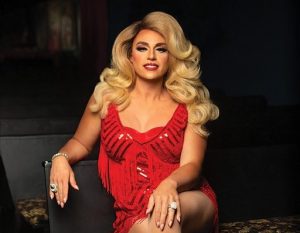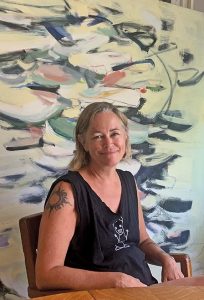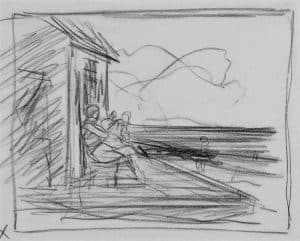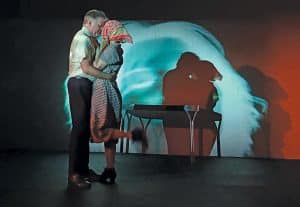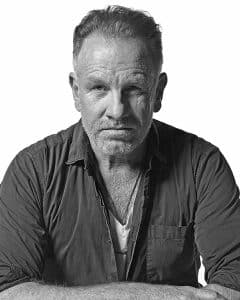Bird on Richard
The Playful Eroticism of Outsider Artist William Accorsi
by Steve Desroches
A man reclines nude on a patch of green grass sporting an enormous erection with a red songbird perched on the tip. That may sound like an erotic and comedic moment in nature captured on a summer day far out on Herring Cove Beach, where such things are more possible than anywhere else in Provincetown, but it’s actually closer to home than that. It’s a stand out piece in William Accorsi’s exhibition at the Woodman/Shimko Gallery that features the 87-year-old artist’s erotic sculptural work, in their first ever showing.
This is not just a show of his work, but also a bit of a coming out party of sorts. Accorsi has spent his life as a folk artist, on the outside, a place he didn’t necessarily choose to be, but which he occupied happily for close to seven decades. His gentle demeanor and commitment to life as an artist have made his sculptures vibrate with intensity, as there is purpose to his vision and a loyalty to his voice. And as he says, he paid a price for that. Being on the outside sounds romantic to those who are not.
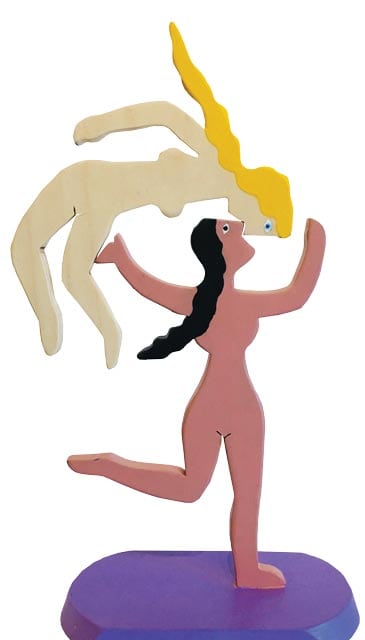
Nevertheless, he cherishes the freedom that comes with that. As a largely self-taught artist, the braces of academic thought, rigid collectors and curators, or the whims of passing fads did not hold him back. His life and his life’s work were solely for him to define, and you can take it, or you can leave it. But the one aspect of his work that stayed hidden all these years was his erotic sculptures, which he began doing in the 1970s. When his side job as a children’s author took off, his sexually themed work needed to step aside, despite how serious of a theme it was to him. But he’s taken the closet door these works were held behind off its hinges now.
“I wrote 11 children’s books and all of them are now out of print,” says Accorsi. “So I thought now is the time, and I’m going to show this work. They’re basically wholesome pieces, which is what they really are. They’re playful. There’s just a pure passion. I feel deeply about them. Sex in our world is on my mind constantly.”
Sexuality and gender continue to go through major cultural shifts in American culture, and Accorsi has seen tremendous change in his own life. But he still sees a rigidity about sex in our culture and in traditional gender roles, particularly expectations about masculinity and manhood. Men, Accorsi says, are still consistently challenged to prove they’re a man in so many ways resulting in what many now call “toxic masculinity.” No matter how unhealthy the process, Accorsi sees how men are pushed in so many subtle ways to prove they’re a man, from stifling a full range of emotions to asserting dominance. And in general, Puritanical views on sex in America run deep, robbing us all of a fuller and happier intimate life.
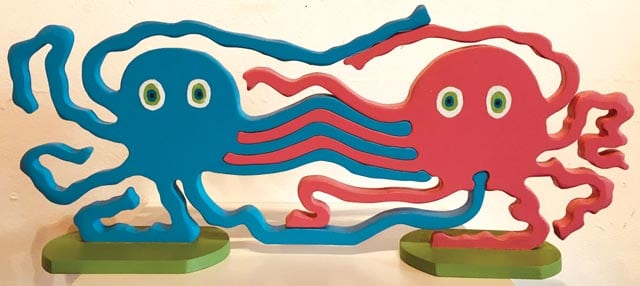
It’s these themes that he’s gnawed on since his college days when, as a star football player, he attended what is now Muskingum University near Columbus, Ohio, on an athletic scholarship. Born in 1931 just outside of Pittsburgh to Italian immigrant parents – his father a coal miner who died young, his mother a housewife who never learned to read or write – going to college was an absolute dream. And he relished his opportunity, choosing physical education as his major, as he planned to be a coach. But one day, while taking a general studies requirement, his class went to the Cleveland Museum of Art to see a Matisse show. That ignited something within. He switched to being an education major, but in hindsight he knows that that was the moment he chose to be an artist, which at time was in opposition to life as a football star and expectations of such men. After going to a Van Gogh show at the Toledo Museum of Art his senior year, his decision was final.
He began to paint, but after seeing a stained glass exhibit that led him toward sculpture, as the process appealed to him. He added to that what he says is his innate sense of color, which he says you can’t teach, but many try anyway. He taught for seven years in Columbus before moving to Martha’s Vineyard, where he taught the sixth grade in Vineyard Haven and began to show in a gallery in Oak Bluffs, garnering instant attention across the island. There he met several New Yorkers with ties to Provincetown, which led to an invitation to present a show at the Mews in the summer of 1961, his first time to the Cape tip.
“I was kind of living hand to mouth in those days,” says Accorsi. “Plus I was a very shy guy and didn’t talk to a lot of people. I didn’t have any place to stay. No one asked me where I was staying and I didn’t bring it up. So I spent the whole night standing in Provincetown on a corner. All night long. The sun came up and I thumbed a ride back to Woods Hole and went back to the Vineyard. But I was so charmed by Provincetown.”
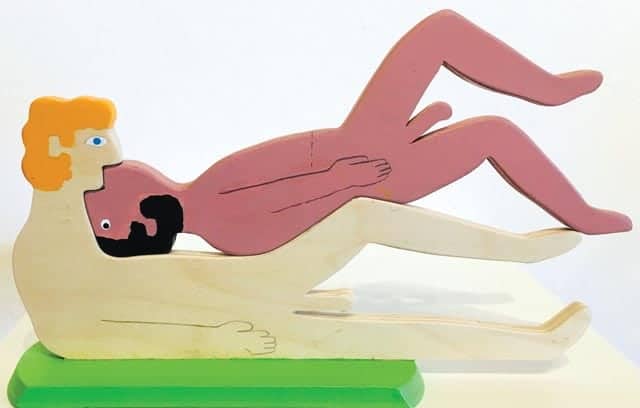
One day when he left his classroom for lunch at a café in Vineyard Haven he was overwhelmed by a feeling of not wanting to go back. He did return, but only to clean out his desk and walk away forever. Impulsive, yes. Regrets? No. None. Soon thereafter he had two solo shows at what is now the Museum of Art and Design in New York City.
On the Vineyard he also met Alice and Ray Brock, several years before Alice became a counterculture icon with her restaurant that became the inspiration for Arlo Guthrie’s hippie anthem. He followed them to New York where they all lived briefly, before he headed to the Green Mountains of Vermont and then upstate New York, where he now lives in the town of Woodstock. But Alice’s long family history here in Provincetown, and her moving here full-time in 1979, gave Accorsi some roots here. He’s visited frequently, and his work has popped up here from time to time over the years, though this is his first full show in town since 1961. And he thinks this is the right time and town for his current work. He came to see the Carnival parade for the very first time this past August and marveled at the freedom, acceptance, and playful sexuality on display.
“That was an absolutely exciting day for me,” says Accorsi. “I was so taken by people who brought their children. How great. Gayness is just a part of life. It was just a stunning acceptance of gay people. I look at the gay guys in Provincetown and they seem so different than the straight guys I see everyday here. There’s a different feeling. There’s a different feeling in Provincetown. It just seems healthier. Free.”
William Accorsi’s work will be on exhibition at the Woodman/Shimko Gallery, 398 Commercial St., through October 5. A special opening reception will be held at the gallery on Friday, September 21 from 6 to 9 p.m. For more information visit woodmanshimkogallery.com or call 508.487.0606.



